Stream
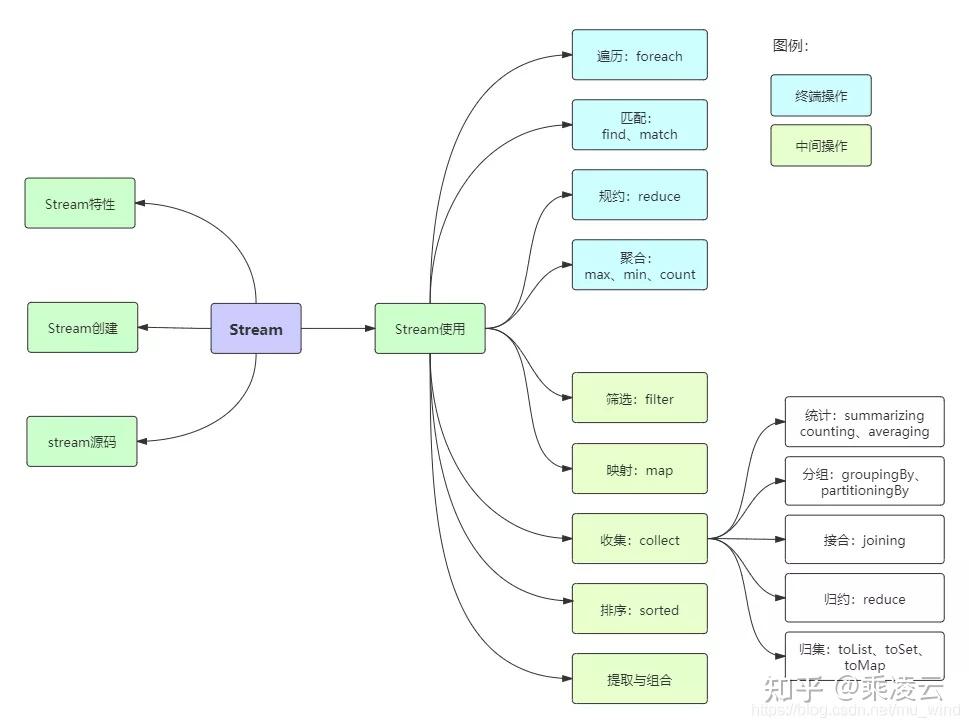
Stream is used to process a series of operations on a collection in a pipeline. The pipeline consists of a source, zero or more intermediate operations, and a terminal operation. Stream is a one-time object that cannot be reused after the terminal operation is executed.
Stream Creation
Create Stream using java.util.Collection.stream()
List<String> list = Arrays.asList("a", "b", "c");
// create a stream
Stream<String> stream = list.stream();
// creae a parallel stream
Stream<String> parallelStream = list.parallelStream();
Exercising Code
class Person {
private String name; // 姓名
private int salary; // 薪资
private String sex; //性别
private String area; // 地区
// 构造方法
public Person(String name, int salary,String sex,String area) {
this.name = name;
this.salary = salary;
this.sex = sex;
this.area = area;
}
// 省略了get和set,请自行添加
public String getName() {
return name;
}
public void setName(String name) {
this.name = name;
}
public int getSalary() {
return salary;
}
public void setSalary(int salary) {
this.salary = salary;
}
public String getSex() {
return sex;
}
public void setSex(String sex) {
this.sex = sex;
}
public String getArea() {
return area;
}
public void setArea(String area) {
this.area = area;
}
@Override
public String toString() {
return this.name + " " +this.salary + " " + this.sex + " " + this.area;
}
}
List<Person> personList = new ArrayList<Person>();
personList.add(new Person("Tom", 8900, "male", "New York"));
personList.add(new Person("Jack", 7000, "male", "Washington"));
personList.add(new Person("Lily", 7800, "female", "Washington"));
personList.add(new Person("Anni", 8200, "female", "New York"));
personList.add(new Person("Owen", 9500, "male", "New York"));
personList.add(new Person("Alisa", 7900, "female", "New York"));
traverse and match (foreach/find/match)
Stream support traverse and match operations. elements are Optional inside the stream.
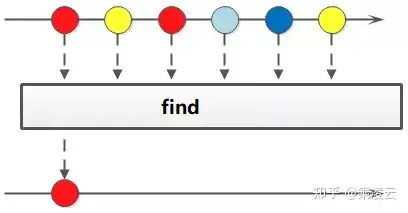
public class StreamTest {
public static void main(String[] args) {
List<Integer> list = Arrays.asList(7, 6, 9, 3, 8, 2, 1);
// traverse and print
list.stream().filter(x -> x > 6).forEach(System.out::println);
// match the first element
Optional<Integer> findFirst = list.stream().filter(x -> x > 6).findFirst();
// match any element
Optional<Integer> findAny = list.parallelStream().filter(x -> x > 6).findAny();
// whether contains element larger than 6
boolean anyMatch = list.stream().anyMatch(x -> x < 6);
System.out.println("match the first element: " + findFirst.get());
System.out.println("match any element: " + findAny.get());
System.out.println("whether contains element larger than 6:" + anyMatch);
}
}
forEach:Traverse the stream and execute the specified operation for each element in the stream.findFirst:(Optional)Find the first element in the stream.findAny:(Optional)Find any element in the stream. (randomly selected)anyMatch:(Boolean value)Whether any element in the stream matches the specified predicate, if any, returns true.
filter (filter)

public class StreamTest {
public static void main(String[] args) {
List<Integer> list = Arrays.asList(6, 7, 3, 8, 1, 2, 9);
Stream<Integer> stream = list.stream();
stream.filter(x -> x > 7).forEach(System.out::println);
}
}
filter:(accept Predicate) Filter out the elements that meet the specified conditions in the stream and return a new stream.distinct:remove duplicate elements in the stream and return a new stream.limit:limit(2)(keep the first two element, just like SQL TOP)skip:skip(2)(skip the first two element)
Filter the person whose salary is greater than 8000, return the name of the person, and save it in the list.
List<String> newPersonList = personList.stream()
.filter(person -> person.getSalary() > 8000)
.map(Person::getName)
.collect(Collectors.toList());
// output : [Tom, Anni, Owen]
Aggregate (count/max/min)
just like SQL, aggregate functions are used to calculate the sum, average, maximum, minimum, etc. of the elements in the stream.
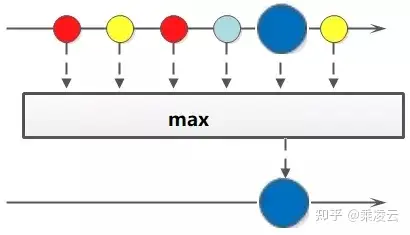
- get the longest string in the list
public class StreamTest {
public static void main(String[] args) {
List<String> list = Arrays.asList("adnm", "admmt", "pot", "xbangd", "weoujgsd");
Optional<String> max = list.stream().max(Comparator.comparing(String::length));
// or in this way
Optional<String> max = list.stream().max((o1, o2) -> o1.length() - o2.length());
// output : weoujgsd
// [pot, adnm, admmt, xbangd, weoujgsd] it will sort the list in ascending order and get the last element
// for min, it will get the first element
}
}
- get the maximum int of the list
List<Integer> list = Arrays.asList(7, 6, 9, 4, 11, 6);
Optional<Integer> max = list.stream().max(Integer::compareTo);
// output : 11
// or in this way
Optional<Integer> max = list.stream().max((o1, o2) -> o1 - o2);
- get the maximum salary of the person
Optional<Person> maxSalary = personList.stream().max(Comparator.comparingInt(Person::getSalary));
System.out.println(maxSalary.get());
// or
Optional<Person> maxSalary = personList.stream().max((p1, p2) -> p1.getSalary() - p2.getSalary());
- count the number of elements larger than 7
List<Integer> list = Arrays.asList(7, 6, 9, 4, 11, 6);
long count = list.stream().filter(x -> x > 7).count();
System.out.println(count);
Map (map/flatMap) (peek)
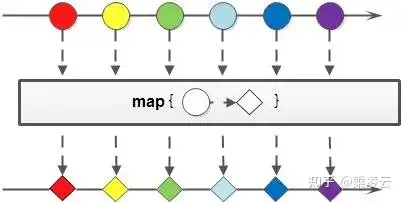
- convert all element to upper cases
String[] strArr = { "abcd", "bcdd", "defde", "fTr" };
List<String> stringList = Arrays.stream(strArr).map(String::toUpperCase).collect(Collectors.toList());
System.out.println(stringList); // [ABCD, BCDD, DEFDE, FTR]
- Each person’s salary increase 1000 (modify the original list, we can use peek)
public class StreamTest {
public static void main(String[] args) {
List<Person> personList = new ArrayList<Person>();
personList.add(new Person("Tom", 8900, 23, "male", "New York"));
personList.add(new Person("Jack", 7000, 25, "male", "Washington"));
personList.add(new Person("Lily", 7800, 21, "female", "Washington"));
personList.add(new Person("Anni", 8200, 24, "female", "New York"));
personList.add(new Person("Owen", 9500, 25, "male", "New York"));
personList.add(new Person("Alisa", 7900, 26, "female", "New York"));
// 不改变原来员工集合的方式
List<Person> personListNew = personList.stream().map(person -> {
Person personNew = new Person(person.getName(), 0, 0, null, null);
personNew.setSalary(person.getSalary() + 10000);
return personNew;
}).collect(Collectors.toList());
System.out.println("一次改动前:" + personList.get(0).getName() + "-->" + personList.get(0).getSalary());
System.out.println("一次改动后:" + personListNew.get(0).getName() + "-->" + personListNew.get(0).getSalary());
// 改变原来员工集合的方式 (not recommended)
List<Person> personListNew2 = personList.stream().map(person -> {
person.setSalary(person.getSalary() + 1000);
return person;
}).collect(Collectors.toList());
// or use peek
List<Person> personListNew2 = personList.stream().peek(person -> person.setSalary(person.getSalary() + 1000))
.collect(Collectors.toList());
System.out.println("二次改动前:" + personList.get(0).getName() + "-->" + personListNew.get(0).getSalary());
System.out.println("二次改动后:" + personListNew2.get(0).getName() + "-->" + personListNew.get(0).getSalary());
}
}
- concatenate the two list
List<String> list = Arrays.asList("m,k,l,a", "1,3,5,7");
List<String> newList = list.stream().flatMap(s -> {
// Stream<String[]>
String[] split = s.split(",");
Stream<String> stream = Arrays.stream(split);
return stream;
}).collect(Collectors.toList());
System.out.println(newList);
Reduce (reduce) Hard

- get the sum/max/product of list
public class StreamTest {
public static void main(String[] args) {
List<Integer> list = Arrays.asList(1, 3, 2, 8, 11, 4);
// sum1
Optional<Integer> sum = list.stream().reduce((x, y) -> x + y);
// sum2
Optional<Integer> sum2 = list.stream().reduce(Integer::sum);
// sum3
Integer sum3 = list.stream().reduce(0, Integer::sum);
// product
Optional<Integer> product = list.stream().reduce((x, y) -> x * y);
// max1
Optional<Integer> max = list.stream().reduce((x, y) -> x > y ? x : y);
// max2
Integer max2 = list.stream().reduce(1, Integer::max);
System.out.println("list sum:" + sum.get() + "," + sum2.get() + "," + sum3);
System.out.println("list product:" + product.get());
System.out.println("list sum:" + max.get() + "," + max2);
// another way is map the list to Integer. IntegerStream has sum/max/min/average
// for statistics using collect would be better, this is just for learning
Integer sum = list.stream().mapToInt(Integer::intValue).sum();
Integer max = list.stream().mapToInt(Integer::intValue).max().getAsInt();
Integer min = list.stream().mapToInt(Integer::intValue).min().getAsInt();
Double average = list.stream().mapToInt(Integer::intValue).average().getAsDouble();
}
}
-
get the sum of the person’s salary get the maximum salary of the person
public class StreamTest {
public static void main(String[] args) {
List<Person> personList = new ArrayList<Person>();
personList.add(new Person("Tom", 8900, 23, "male", "New York"));
personList.add(new Person("Jack", 7000, 25, "male", "Washington"));
personList.add(new Person("Lily", 7800, 21, "female", "Washington"));
personList.add(new Person("Anni", 8200, 24, "female", "New York"));
personList.add(new Person("Owen", 9500, 25, "male", "New York"));
personList.add(new Person("Alisa", 7900, 26, "female", "New York"));
// The first 0 in the reduce function is the initial value, used to store the sum of the salary.
// sum1:
Optional<Integer> sumSalary = personList.stream().map(Person::getSalary).reduce(Integer::sum);
// sum2:
Integer sumSalary2 = personList.stream().reduce(0, (sum, p) -> sum += p.getSalary(),
(sum1, sum2) -> sum1 + sum2);
// sum3:
Integer sumSalary3 = personList.stream().reduce(0, (sum, p) -> sum += p.getSalary(), Integer::sum);
// max1:
Integer maxSalary = personList.stream().reduce(0, (max, p) -> max > p.getSalary() ? max : p.getSalary(), Integer::max);
// max2:
Integer maxSalary2 = personList.stream().reduce(0, (max, p) -> max > p.getSalary() ? max : p.getSalary(), (max1, max2) -> max1 > max2 ? max1 : max2);
// max3: get the person object
Optional<Person> a = personList.stream().reduce(BinaryOperator.maxBy((Comparator.comparingInt(Person::getSalary))));
System.out.println("sum of salary:" + sumSalary.get() + "," + sumSalary2 + "," + sumSalary3);
System.out.println("maximum of salary:" + maxSalary + "," + maxSalary2);
}
}
Collect (collect) most important
collect the elements in the stream into a collection or other data structure.
most dependent on java.util.stream.Collectors
toList/toSet/toMap
public class StreamTest {
public static void main(String[] args) {
List<Integer> list = Arrays.asList(1, 6, 3, 4, 6, 7, 9, 6, 20);
List<Integer> listNew = list.stream().filter(x -> x % 2 == 0).collect(Collectors.toList());
Set<Integer> set = list.stream().filter(x -> x % 2 == 0).collect(Collectors.toSet());
List<Person> personList = new ArrayList<Person>();
personList.add(new Person("Tom", 8900, 23, "male", "New York"));
personList.add(new Person("Jack", 7000, 25, "male", "Washington"));
personList.add(new Person("Lily", 7800, 21, "female", "Washington"));
personList.add(new Person("Anni", 8200, 24, "female", "New York"));
Map<?, Person> map = personList.stream().filter(p -> p.getSalary() > 8000).collect(Collectors.toMap(Person::getName, p -> p));
System.out.println("toList:" + listNew);
System.out.println("toSet:" + set);
System.out.println("toMap:" + map);
}
}
statistics (count/average/sum/max/min)
Collectors provides a variety of statistical methods:
- count : count()
- average : averagingInt/averagingLong/averagingDouble
- max/min : maxBy/minBy
- sum : summingInt/summingLong/summingDouble
- calculate all the statistics : summarizingInt/summarizingLong/summarizingDouble
- statistics of the person’s number, avg salary,sum of salary,max salary.
public class StreamTest {
public static void main(String[] args) {
List<Person> personList = new ArrayList<Person>();
personList.add(new Person("Tom", 8900, 23, "male", "New York"));
personList.add(new Person("Jack", 7000, 25, "male", "Washington"));
personList.add(new Person("Lily", 7800, 21, "female", "Washington"));
// count
Long count = personList.stream().collect(Collectors.counting());
// avg salary
Double average = personList.stream().collect(Collectors.averagingDouble(Person::getSalary));
// max salary
Optional<Integer> max = personList.stream().map(Person::getSalary).collect(Collectors.maxBy(Integer::compare));
// sum salary , for easy to use, map to int and call sum()
Integer sum = personList.stream().collect(Collectors.summingInt(Person::getSalary));
// SummaryStatistics : count/average/sum/max/min
DoubleSummaryStatistics collect = personList.stream().collect(Collectors.summarizingDouble(Person::getSalary));
System.out.println("员工总数:" + count);
System.out.println("员工平均工资:" + average);
System.out.println("员工工资总和:" + sum);
System.out.println("员工工资所有统计:" + collect);
}
}
groupingBy/partitioningBy (mapping)
- groupingBy : cut the stream into multiple
Maps - partitioningBy : cut the stream into two
Maps(salary > 8000 and salary <= 8000)

-
partition the person into two groups (salary > 8000 and salary <= 8000) group the person by sex and area
public class StreamTest {
public static void main(String[] args) {
List<Person> personList = new ArrayList<Person>();
personList.add(new Person("Tom", 8900, "male", "New York"));
personList.add(new Person("Jack", 7000, "male", "Washington"));
personList.add(new Person("Lily", 7800, "female", "Washington"));
personList.add(new Person("Anni", 8200, "female", "New York"));
personList.add(new Person("Owen", 9500, "male", "New York"));
personList.add(new Person("Alisa", 7900, "female", "New York"));
// 将员工按薪资是否高于8000分组
Map<Boolean, List<Person>> part = personList.stream().collect(Collectors.partitioningBy(x -> x.getSalary() > 8000));
// 将员工按性别分组
Map<String, List<Person>> group = personList.stream().collect(Collectors.groupingBy(Person::getSex));
// 将员工按性别分组, return the name of the person
Map<String, List<String>> group2 = personList.stream().collect(Collectors.groupingBy(Person::getSex, Collectors.mapping(Person::getName, Collectors.toList())));
// 将员工先按性别分组,再按地区分组
Map<String, Map<String, List<Person>>> group2 = personList.stream().collect(Collectors.groupingBy(Person::getSex, Collectors.groupingBy(Person::getArea)));
System.out.println("员工按薪资是否大于8000分组情况:" + part);
System.out.println("员工按性别分组情况:" + group);
System.out.println("员工按性别、地区:" + group2);
}
}
// {female={New York=[Anni 8200 female New York, Alisa 7900 female New York], Washington=[Lily 7800 female Washington]}, male={New York=[Tom 8900 male New York, Owen 9500 male New York], Washington=[Jack 7000 male Washington]}}
joining
join the elements in the stream into a string
public class StreamTest {
public static void main(String[] args) {
List<Person> personList = new ArrayList<Person>();
personList.add(new Person("Tom", 8900, 23, "male", "New York"));
personList.add(new Person("Jack", 7000, 25, "male", "Washington"));
personList.add(new Person("Lily", 7800, 21, "female", "Washington"));
String names = personList.stream().map(p -> p.getName()).collect(Collectors.joining(","));
System.out.println("all employee:" + names);
List<String> list = Arrays.asList("A", "B", "C");
String string = list.stream().collect(Collectors.joining("-"));
System.out.println("concatenated string:" + string);
}
}
Reducing
Compared with the reduce method of Stream, the reducing method of Collectors is more flexible. It support custom operations.
public class StreamTest {
public static void main(String[] args) {
List<Person> personList = new ArrayList<Person>();
personList.add(new Person("Tom", 8900, 23, "male", "New York"));
personList.add(new Person("Jack", 7000, 25, "male", "Washington"));
personList.add(new Person("Lily", 7800, 21, "female", "Washington"));
// 每个员工减去起征点后的薪资之和(这个例子并不严谨,但一时没想到好的例子)
Integer sum = personList.stream().collect(Collectors.reducing(0, Person::getSalary, (i, j) -> (i + j - 5000)));
System.out.println("员工扣税薪资总和:" + sum);
// stream的reduce
Optional<Integer> sum2 = personList.stream().map(Person::getSalary).reduce(Integer::sum);
System.out.println("员工薪资总和:" + sum2.get());
}
}
Sort (sorted)
- sorted() : sort in ascending order
- sorted(Comparator.reverseOrder()) : sort in descending order
- sorted(Comparator com) : custom sort
- sort person by salary (if salary is the same, sort by age)
public class StreamTest {
public static void main(String[] args) {
List<Person> personList = new ArrayList<Person>();
personList.add(new Person("Sherry", 9000, 24, "female", "New York"));
personList.add(new Person("Tom", 8900, 22, "male", "Washington"));
personList.add(new Person("Jack", 9000, 25, "male", "Washington"));
personList.add(new Person("Lily", 8800, 26, "male", "New York"));
personList.add(new Person("Alisa", 9000, 26, "female", "New York"));
// 按工资升序排序(自然排序)
List<String> newList = personList.stream().sorted(Comparator.comparing(Person::getSalary)).map(Person::getName)
.collect(Collectors.toList());
// 按工资倒序排序
List<String> newList2 = personList.stream().sorted(Comparator.comparing(Person::getSalary).reversed())
.map(Person::getName).collect(Collectors.toList());
// 先按工资再按年龄升序排序
List<String> newList3 = personList.stream()
.sorted(Comparator.comparing(Person::getSalary).thenComparing(Person::getAge)).map(Person::getName)
.collect(Collectors.toList());
// 先按工资再按年龄自定义排序(降序)
List<String> newList4 = personList.stream().sorted((p1, p2) -> {
if (p1.getSalary() == p2.getSalary()) {
return p2.getAge() - p1.getAge();
} else {
return p2.getSalary() - p1.getSalary();
}
}).map(Person::getName).collect(Collectors.toList());
System.out.println("按工资升序排序:" + newList);
System.out.println("按工资降序排序:" + newList2);
System.out.println("先按工资再按年龄升序排序:" + newList3);
System.out.println("先按工资再按年龄自定义降序排序:" + newList4);
}
}
distinct/limit/skip
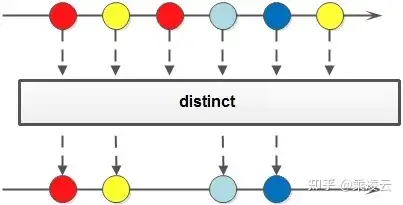
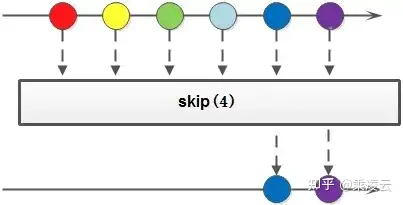
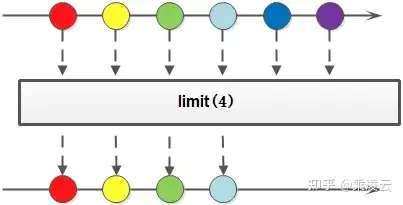
public class StreamTest {
public static void main(String[] args) {
String[] arr1 = { "a", "b", "c", "d" };
String[] arr2 = { "d", "e", "f", "g" };
Stream<String> stream1 = Stream.of(arr1);
Stream<String> stream2 = Stream.of(arr2);
// concat:合并两个流 distinct:去重
List<String> newList = Stream.concat(stream1, stream2).distinct().collect(Collectors.toList());
// limit:限制从流中获得前n个数据
List<Integer> collect = Stream.iterate(1, x -> x + 2).limit(10).collect(Collectors.toList());
// skip:跳过前n个数据
List<Integer> collect2 = Stream.iterate(1, x -> x + 2).skip(1).limit(5).collect(Collectors.toList());
System.out.println("流合并:" + newList);
System.out.println("limit:" + collect);
System.out.println("skip:" + collect2);
}
}
